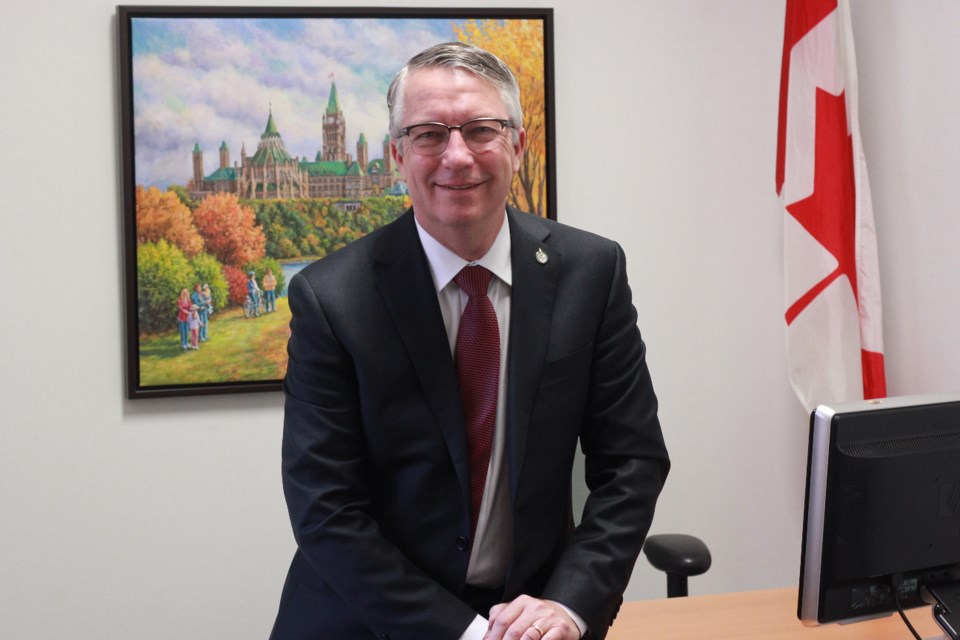After the Liberals won a minority government in the federal election, Guelph’s MP Lloyd Longfield says there's an urgency to get everything done within the first two years.
He says the upcoming year comes with new priorities and the top priorities for 2020 will be battling housing and mental health and addictions.
Longfield says housing will be addressed on many levels such as providing homes for seniors, new homes for young people, solving the homelessness crisis in Guelph and how it interacts with the other priority of mental health and addictions.
“The opioid crisis is across Canada. It’s in Guelph. We’ve seen a real rise in the drugs on the street whether its crystal meth or different opiates,” says Longfield, adding that it is important to respond to the need when necessary and the people working in the front lines are crucial in determining what that need is.
“A lot of people are homeless because of mental health and addictions so you have to solve mental health and addictions problems before you can prepare to be able to move into homes. And sometimes mental health is because you don’t have a home. They go hand in hand,” says Longfield.
“The connection between those two areas in Guelph is very strong and we’ve got great community involvement,” says Longfield, giving the recent example of Legacy Guelph, a local men's group committed to generating 100 new homes in Guelph in the next two years.
He says all three orders of governments have to work together and the projects working on homelessness and mental health and addictions interface with the city and the province. While the county delivers support services, the city has to provide support through building codes by freeing up land for development to allow more homes to be built in Guelph.
He says part of homelessness and mental health and the connection to small businesses is creating income streams for people so that they can lift themselves out of poverty by finding the right place to apply those skills.
Longfield says he will also be working on a number of projects to address climate action such as a funding public transit, installing bike lanes and walking paths.
“We have to get past the eco-anxiety to a place where we’re actually solving problems,” says Longfield adding that he will work on is energy conservation on homes to encourage retrofitting, windows and caulking, thermostats and high-efficiency appliances.
“We have a federal goal of planting two billion trees. We have a local goal of 40 per cent tree canopy.”
Longfield says there's a great need to address the inequity women face and its important to support women and ensure they get the right jobs and that those jobs pay an equal wage to men.
“When you look at small business support, the earnings gap between women and men is still a real thing and we could free up the numbers, $1.6 billion into the economy if we’re able to get women earning what men earn,” says Longfield.
With women in charge of the Chamber of Commerce, Innovation Guelph, Business Centre Guelph-Wellington, The Circular Food Economy, 10C and Linamar among others, Longfield says it is important to keep encouraging women.
“The federal government has programs to encourage women entrepreneurship. We’ve been able to get some funding to the programs here, but the more funding you get, the more development you get which then attracts more investment, private investment as well as government investment,” says Longfield.
He says the support for seniors and vulnerable people in Guelph is going to be ongoing.
“We’ve got 10-year plans around housing so that's going to be ongoing through 2020,” says Longfield.
New priorities include the $10 million Circular Food Economy which will create 50 new businesses.
The new parliamentary intern Caroline Woodward assigned to Guelph — from the Parliamentary Internship Program started by Alf Hales from Guelph that assigns 10 interns across Canada — will be connecting to organizations internationally from which Guelph can learn from.
Longfield will also be working on improving child literacy, focusing on Canadian literacy.
“We need Canadian stories. We need Canadian viewpoints on things and readership of Canadian authors have dropped 50 per cent in the last eight years,” says Longfield.
He also has a goal of getting the boil water advisories to zero by March 2021 and has been visiting several Indigenous communities in the past year to talk about the water challenges they have.
“Instead of us providing the solutions, them telling us what they need and working on solutions together,” says Longfield adding that he will continue to visit more remote communities in the new year.
“Making the connections between our federal initiatives and local initiatives is going to be a big job for the year 2020.”
